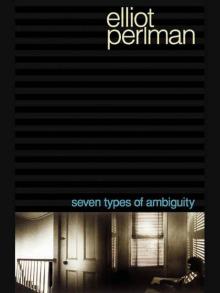Read Seven Types of Ambiguity Storyline:
Seven Types of Ambiguity is a psychological thriller and a literary adventure of breathtaking scope. Celebrated as a novelist in the tradition of Jonathan Franzen and Philip Roth, Elliot Perlman writes of impulse and paralysis, empty marriages, lovers, gambling, and the stock market; of adult children and their parents; of poetry and prostitution, psychiatry and the law. Comic, poetic, and full of satiric insight, Seven Types of Ambiguity is, above all, a deeply romantic novel that speaks with unforgettable force about the redemptive power of love.The story is told in seven parts, by six different narrators, whose lives are entangled in unexpected ways. Following years of unrequited love, an out-of-work schoolteacher decides to take matters into his own hands, triggering a chain of events that neither he nor his psychiatrist could have anticipated. Brimming with emotional, intellectual, and moral dilemmas, this novel-reminiscent of the richest fiction of the nineteenth century in its labyrinthine complexity-unfolds at a rapid-fire pace to reveal the full extent to which these people have been affected by one another and by the insecure and uncertain times in which they live. Our times, now.From Publishers WeeklyBy copping the title of William Empson's classic of literary criticism, Australian writer Perlman (Three Dollars) sets a high bar for himself, but he justifies his theft with a relentlessly driven story, told from seven perspectives, about the effects of the brief abduction of six-year-old Sam Geraghty by Simon Heywood, his mother Anna's ex-boyfriend. Charismatic, unemployed Simon is still obsessed with Anna nine years after their breakup—to the dismay of his present lover, Angelique, a prostitute. Anna's stockbroker husband, Joe, is one of Angelique's regulars, which feeds Simon's flame. When Angelique turns Simon in to the cops, he claims he had permission to pick Sam up; his fate hinges on whether Anna will back up his lie. Most of the perspectives are linked to Simon's shrink, Alex Klima, who writes to Anna and counsels Simon, Angelique and Joe's co-worker, Dennis. The most successful voices belong to Joe, who's spent his career on the edge of panic, and Dennis, whose bitter rants provide a corrective to Klima's unctuous psychological omniscience. Perlman, a lawyer, aims for a literary legal novel—think Grisham by way of Franzen—and the ambition is admirable though the product somewhat uneven. Simon's obsessions, his self-righteousness and his psychological blackmail, give him a perhaps unintended creepiness, and the novel, as big and juicy as it is, may not offer sufficient closure. Copyright © Reed Business Information, a division of Reed Elsevier Inc. All rights reserved. From The New YorkerCheekily swiping the title of William Empson's seminal work of literary criticism, this second novel by Perlman, an Australian writer, presents seven first-person narrators—whose lives are all nudged off course by a man's abduction of his ex-girlfriend's young son—in a compulsively readable tangle. At the center is a psychiatrist who treats several of the characters, and whose narrative provides some basis for assessing the partial perspectives of the six others. The abductor's self-justifying rants about truth, literature, and poststructuralist theory win over his shrink and, it seems, everyone else. Still, if the individual stories of these characters are compelling, their attempts at Empsonian hermeneutics are less so. Copyright © 2005 The New YorkerPages of Seven Types of Ambiguity :
